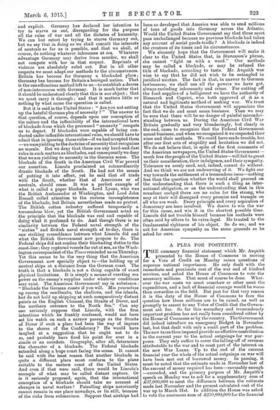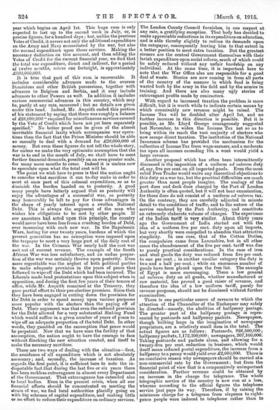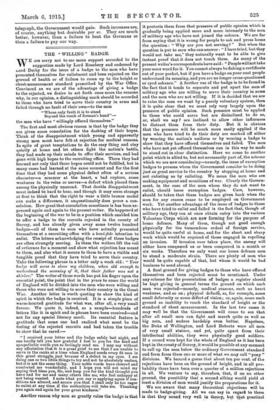A PLEA FOR POSTERITY.
THE summary financial statement which Mr. Asquith presented to the House of Commons in moving for a Vote of Credit on Monday raises questions of supreme national importance. He only dealt with the immediate and proximate cost of the war and of kindred services, and asked the House of Commons to vote the necessary millions. That must of course be done. What- ever the war costs we must somehow or other meet the expenditure, and a lack of financial courage would be worse than cowardice in the field. But just for that very reason it is the duty of the House of Commons to face the question how these millions are to be raised, as well as promptly to assent to any Votes of Credit that the Govern- ment ask for. So far this secondary and tremendously important problem has not really been considered either by the House of Commons or by the country. The Government did indeed introduce an emergency Budget in November last, but that dealt with only a small part of the problem. The new taxes then imposed provide no effective contribution in the current year to the actual outgoings for war pur- poses. They only suffice to cover the falling-off of revenue attributable to the war and to meet part of the interest on the new War Loans. Up to the end of the current financial year the whole of the actual outgoings on war will have been met out of borrowed money. In passing, it must be noted that the estimate made in November last of the amount of money required line been—excusably enough —exceeded, and the primary purpose of Mr. Aaquitles speech on Monday was to ask for a supplementary sum of £37,000,000 to meet the difference between the estimate made last November and the present calculated cost of the war up to March 31st. In addition the House was asked to vote the enormous sum of £250,000,000 for the financial year which begins on April lst. This huge sum is only expected to last up to the second week in July, or, in precise figures, for a hundred clays ; but, unlike the previous Votes of Credit, it covers not only the additional expenditure on the Army and Navy necessitated by the war, but also the normal expenditure upon those services. Making the necessary deduction on this account, and then adding the Votes of Credit for the current financial year, we find that the total war expenditure, direct and indirect, for a period of twelve months, minus one fortnight, is approximately X590,000,000.
It is true that part of this sum is recoverable. It includes considerable advances made to the oversee Dominions and other British possessions, together with advances to Belgium and Serbia, and it may include advances to other Powers as well. In addition it includes various commercial advances in this country, which may be, partly at any rate, recovered ; but no details are given under this head. Indeed, Mr. Asquith ended this portion of his statement by saying that there was roughly a balance of £28,000,000 "required for miscellaneous services covered by the Vote of Credit which have not yet been separately specified." No better proof can be given of the almost inevitable financial laxity which accompanies war opera- tions than the fact that the Prime Minister should be able so casually to deal with a demand for .228,000,000 of money. But even these figures do not tell the whole story, for unless we make the very optimistic assumption that the war is to end in the month of July, we shall have to meet further financial demands, possibly on an even greater scale, • for many more months to conic. Indeed it is useless now to speculate upon what the total cost will be. The point we wish here to press is that the nation ought to consider what sacrifices it can to-day make in order to meet at once part of this colossal expenditure, so as to diminish the burden handed on to posterity. A good many people have latterly argued that as posterity will enjoy the advantages of a successful war, so posterity may honourably be left to pay for those advantages in the shape of yearly interest upon a swollen National Debt. This is always the argument of the man who wishes his obligations to be met by other people. If
our ancestors had acted upon this principle, the country
would never have been free from a crushing burden of Debt, ever increasing with each new war. In the Napoleonic Wars, lasting for over twenty years, burdens of which the present generation has no conception were imposed upon the taxpayer to meet a very large part of the daily cost of the war. In the Crimean War nearly half the cost was suet out of current revenue. The example of the South African War was less satisfactory, and an undue propor- tion of the war was certainly thrown upon posterity. Even more regrettable was the neglect of both political parties to make adequate provision in the years of peace that followed to wipe off the Debt which had been incurred. The Liberals made loud protestations upon this subject when in opposition, and during the first few years of their tenure of office, while Mr. Asquith remained at the Treasury, they gave partial effect to their pre-election promises. Since then they have been engaged in cutting down the provision for the Debt in order to spend money upon various purposes snore popular with the electors than the paying off of Debt. Their argument was that even the reduced provision for the Debt allowed for a very substantial Sinking Fund which would suffice in a given number of years of peace to wipe off an adequate proportion of the total Debt. In other words, they gambled on the assumption that peace would be perpetual. Now that we have seen the futility of that assumption, the nation ought to have the courage to face without flinching the new situation created, and itself to make the necessary sacrifices.
There are two ways of dealing with the situation—first, the avoidance of all expenditure which is not absolutely necessary; and, secondly, the increase of taxation. As regards the first point, it is sufficient here to note the in- disputable fact that during the last five or six years there has been reckless extravagance in almost every Department of the Government. That extravagance has extended also to local bodies. Even in the present crisis, when all our financial efforts should be concentrated on meeting the strain of war, we find local authorities placidly going on with big schemes of capital expenditure, and making little or no effort to reduce their expenditure on ordinary services. The London County Council furnishes, in one respect at any rate, a gratifying exception. That body has decided to make appreciable reductions in its expenditure on education, and is able thereby slightly to reduce its demands upon the ratepayer, consequently leaving him to that extent in a better position to meet extra taxation. But the greatest sinners are the central Government themselves with their lavish expenditure upon social reform, much of which could be safely reduced without any unfair hardship on any individual. At the same time, it is important here to note that the War Office also are responsible for a good deal of waste. Stories are now coming in from all parts of the country of the manner in which food is being wasted both by the army in the field and by the armies in training. And there are also many ugly stories of extravagant profits made by contractors.
With regard to increased taxation the problem is more difficult, but it is worth while to indicate certain means by which conceivably new revenue might be raised. The Income Tax will be doubled after April 1st, and no further increase in this direction is possible. But it is possible, as Mr. Lloyd George courageously suggested last November, to widen the Income Tax net so as to bring within its reach the vast majority of electors who now escape direct taxation. The institution of the National Insurance scheme has provided the mechanism for the collection of Income Tax from wage-earners, soda moderate tax upon all incomes exceeding 10s. a week would yield a large revenue.
Another proposal which has often been intermittently discussed is the imposition of a uniform ad valore,n duty of, say, five per cent, on all imported goods. Even the most rabid Free Trader would waive any theoretical objections to this duty as a war tax, but the practical difficulties are much greater than most people imagine. The analogy of the port dues and dock dues charged by the Port of London Authority is often quoted, but it will not bear examination, for those dues do not consist of a uniform ad valorem tax. On the contrary, they are carefully adjusted in minute detail to the conditions of traffic, and to the nature of the service rendered by the Port Authority, and constitute an extremely elaborate volume of charges. The experience
of the Indian tariff is very similar. About thirty years
ago the Government of India started out with the idea of a uniform five per cent, duty upon all imports, but very shortly were compelled to abandon that attractive simplicity. In one case, that of the Cotton Duties, the compulsion came from Lancashire, but in all other cases the abandonment of the five per cent, tariff was due to purely practical considerations. In the case of iron and steel goods the duty was reduced from five per cent. to one per cent. ; in another smaller category the duty is two and a half per cent. ; while an enormous number of goods have been placed upon the free list. The example of Egypt is more encouraging. There a low general ad valorem duty on all goods, whether manufactured or raw material, has proved a. good raiser of revenue, and therefore the idea of a low uniform tariff, purely for revenue purposes, should not be dismissed without further examination.
There is one particular source of revenue to which the attention of the Chancellor of the Exchequer may safely be directed—namely, the abolition of halfpenny postage. The greater part of the halfpenny postage is repre- sented by postcards and halfpenny packets. Newspapers, though bulking large in the imagination of newspaper proprietors, are a relatively small item in the total. The actual figures are as fellows: Postcards, 926,500,000; halfpenny packets, 1,172,300,000 ; newspapers, 207,100.000. Taking postcards and packets alone, and allowing for a twenty-five per cent, reduction in business, which would itself mean reduced postal expenditure, the increase from a halfpenny to a penny would yield over £2,000,000. There is no conclusive reason why newspapers should be carried ata non-commercial rate by the Government ; but from the financial point of view that is a comparatively unimportant consideration. Further revenue could be obtained by an increase in the charge for telegrams. The whole telegraphic service of the country is now run at a lose, whereas according to the official figures the telephone service just pays its way. Therefore, if by raising the minimum charge for a telegram from sixpence to eight- pence people were induced to telephone rather than to telegraph, the Government would gain. Such increases are, of course, anything but desirable per Sc. They are much better, however, than a failure to beat the Germans or than a failure to pay our way. •












































 Previous page
Previous page